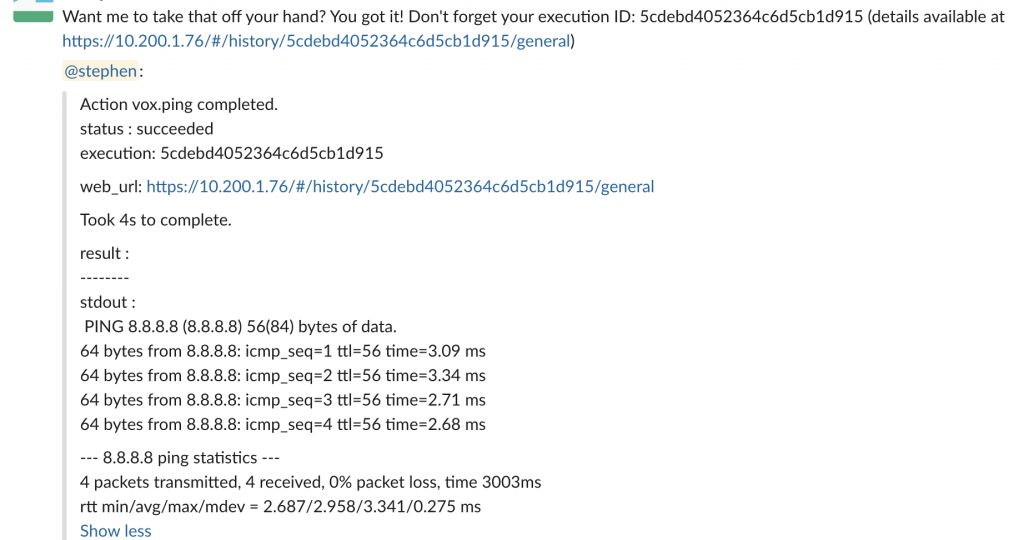In this post I will demonstrate adding a ping action to stackstorm. Then make that action available from chatops (slack) using an action alias.
The Scenario
On a team of network engineers often certain ip addresses need to be checked if they are accessible. This is done using the ping command. If an engineers would like to give visibility on the status of that ping command, she could make that ping command via her chat application. Then everyone in the same room would be able to see the result.
Create the Ping Action
Lets check what this action does, ssh into your stackstorm instance and run:
[cent@st2 packs]$ ping -c 4 1.1.1.1
PING 1.1.1.1 (1.1.1.1) 56(84) bytes of data.
64 bytes from 1.1.1.1: icmp_seq=1 ttl=59 time=3.15 ms
64 bytes from 1.1.1.1: icmp_seq=2 ttl=59 time=2.99 ms
64 bytes from 1.1.1.1: icmp_seq=3 ttl=59 time=2.69 ms
64 bytes from 1.1.1.1: icmp_seq=4 ttl=59 time=2.73 ms
--- 1.1.1.1 ping statistics ---
4 packets transmitted, 4 received, 0% packet loss, time 3002ms
rtt min/avg/max/mdev = 2.696/2.894/3.157/0.201 ms
this is what we want to do, but instead of manually typing the command we want stackstorm to do the action.
Let us use the core.local action to run the command:
[cent@st2 packs]$ st2 run core.local -- ping -c 4 1.1.1.1
..
id: 5cdeb8bb52364c6d5cb1d90f
status: succeeded
parameters:
cmd: ping -c 4 1.1.1.1
result:
failed: false
return_code: 0
stderr: ''
stdout: 'PING 1.1.1.1 (1.1.1.1) 56(84) bytes of data.
64 bytes from 1.1.1.1: icmp_seq=1 ttl=59 time=3.17 ms
64 bytes from 1.1.1.1: icmp_seq=2 ttl=59 time=3.09 ms
64 bytes from 1.1.1.1: icmp_seq=3 ttl=59 time=2.89 ms
64 bytes from 1.1.1.1: icmp_seq=4 ttl=59 time=2.75 ms
--- 1.1.1.1 ping statistics ---
4 packets transmitted, 4 received, 0% packet loss, time 3003ms
rtt min/avg/max/mdev = 2.759/2.981/3.171/0.167 ms'
succeeded: true
So now stackstorm has run the action.
Now create a custom pack folder in /opt/stackstorm/packs and create a folder within that called actions and then create a file called ping.yaml within that. That file should contain:
---
description: Action that executes the Linux ping command on the localhost.
runner_type: "local-shell-cmd"
enabled: true
entry_point: ''
name: ping
parameters:
ip:
description: The ip address to ping
type: string
required: true
cmd:
description: Arbitrary Linux command to be executed on the local host.
required: true
type: string
default: 'ping -c4 {{ip}}'
immutable: true
kwarg_op:
immutable: true
sudo:
default: false
immutable: true
sudo_password:
immutable: true
We are running a local shell command, I’m not 100% on the other paramters and if they are even needed but the cmd command is and is defaulted to ping -c4 {{ ip}} where we intepolate ip.
Now we reload stackstorm to pickup the action: st2ctl reload
Then we run the action: st2 action run my_pack.ping ip=1.1.1.1
Sorted.
Create the Action Alias
Now we are going to create the alias so that the ping can be called from slack.
In /opt/stackstorm/packs/my_pack/aliases/ping.yaml add:
---
name: "ping"
pack: "my_pack"
action_ref: "my_pack.ping"
description: "Execute a local ping."
formats:
- "ping {{ ip }}"
Now you need to reload stackstorm: sudo sysctl reload.
The action should now be available on slack (if you have set chatops up).
Next thing, is the alias will not show up in help if you have not restarted the chatops service, so let us do that now: sudo systemctl restart chatops
when you do !help your alias will now be there:
So let’s run it (remember you can also @botname to run the command): @mybot ping 8.8.8.8
So that is a good demo.

